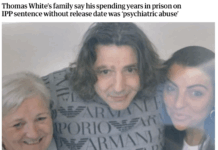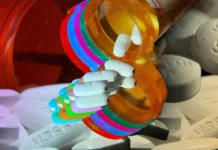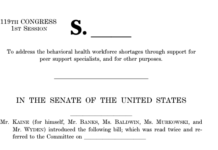Around The Web
People Are Being Involuntarily Committed After Spiraling Into “ChatGPT Psychosis”
From Futurism: "Many ChatGPT users are developing all-consuming obsessions with the chatbot, spiraling into severe mental health crises characterized by paranoia, delusions, and breaks...
People Say They’ve Faced Withdrawals from SSRIs. They Want Recognition and Research
A mere 13 years after being written about by Mad in America and others, NPR realises that SSRI antidepressants might be difficult to get...
Man Developed Psychosis After Being Jailed for 13 years on Indefinite Sentence
From The Guardian: "A prisoner driven to psychosis after being jailed for more than a decade under an indeterminate sentence has finally been moved...
MIA Writer Peter Sterling’s Memoir of Global Engagement
In a publication titled Memoirs of Global Engagement, MIA writer Peter Sterling tells of his path to a life of "global engagement."
Senators Propose Ban on Drug Advertising to Consumers
From The Wall Street Journal: "Sens. Bernie Sanders (I., Vt.) and Angus King (I., Maine) introduced a bill Thursday that would ban pharmaceutical manufacturers...
FDA Approved — And Ineffective
From The Lever (free subscription required): "Federal regulators have authorized hundreds of drugs without evidence they work, and many are dangerous.
Nieraj Jain was puzzled...
Call to Action: Submit a MedWatch Report to the FDA
From Antidepressantinfo.org: "We’ve submitted a petition to the FDA calling for stronger warnings and safer tapering guidance for SSRIs and SNRIs. Now we need...
The Rampant Reach of Pharma’s Hidden Hand
From Patients for Affordable Drugs: "The influence of pharmaceutical companies on patient advocacy organizations is well-documented. Major drug companies and their trade associations pour...
More Than Half of top 100 Mental Health TikToks Contain Misinformation, Study Finds
From The Guardian: "People are increasingly turning to social media for mental health support, yet research has revealed that many influencers are peddling misinformation,...
Alan Cassels: Are We Looking In The Right Place For Answers To Violent Attacks?
From The New Westminster Times: "In the aftermath of one of the worst days in the history of Vancouver, a recent Canadian Press headline...
Safety or System? – Seeking Soteria
From Dr. David Healy's blog: "Samizdat has just been graced with Gene Larkin’s Seeking Soteria accompanied by Bill James fabulous artwork (graced is the...
Spotify is Scrambling to Remove Dozens of Podcasts Promoting Online Prescription Drug Sales
From CNN: "If you search “Adderall” on Spotify’s podcast page, you’ll find health podcasts about ADHD, shows about addiction recovery and comedy podcasts where...
Court Gives Approval of Settlement Providing Better Mental Health Care for Iowa Children
from KCRG.org: On Friday, a federal court gave its approval of a settlement agreement in a lawsuit against the Iowa Department of Health and...
Father Kills Son Because of Antidepressants
From Josef Witt-Doerring's YouTube Channel:
"In this interview, David Carmichael shares his devastating experience with psychiatric medications, describing how Paxil triggered a drug-induced psychosis leading...
It’s Time for Psychologists to Become Activists
From The British Psychological Society: "As a forensic psychologist, I left the NHS when I realised I was complicit in a system that silenced...
Szasz and The Manufacture of Madness Today
From Meer: "In 1970, Thomas Szasz, professor of psychiatry emeritus at State University of New York, published his seminal work, The Manufacture of Madness....
New York Makes it Easier to Commit People With Severe Mental Illnesses
From Politico: "ALBANY, New York — Gov. Kathy Hochul shored up her public safety agenda this week when state lawmakers agreed to loosen the...
Bristol Myers Squibb Schizophrenia Drug Fails Pivotal Test as an Add-On to Antipsychotics
From Med City News. "A Bristol Myers Squibb drug whose landmark FDA approval introduced the first novel mechanism for treating schizophrenia in decades has...
The United States is Witnessing the Return of Psychiatric Imprisonment
From The Guardian. “Across the country, a troubling trend is accelerating: the return of institutionalization – rebranded, repackaged and framed as “modern mental health...
The Daily Mail Reviews Unshrunk
From the Daily Mail in the UK: Katinka Blackford Newman interviews Laura Delano about her memoir Unshrunk. "My life nearly fell apart because I...
A Call for Comfort Brought the Police Instead. Now the Solution Is in Danger
From KFF Health News: "Overcome by worries, Lynette Isbell dialed a mental health hotline in April 2022. She wanted to talk to someone about...
NY Times Finally Figures out ADHD Critics May be Onto Something
From The New York Times: "From 2012 to 2022, the total number of prescriptions for stimulants to treat A.D.H.D. increased in the United States...
Kaine & Banks Introduce Bipartisan Bill to Support Mental Health Care and Substance Use Disorder Recovery
"Today, U.S. Senators Tim Kaine (D-VA) and Jim Banks (R-IN), members of the Senate Health, Education, Labor and Pensions (HELP) Committee, introduced the Providing...
Unshrunk: A Memoir That Upsets the NYT and Which Freethinkers Will Love
Bruce E Levine writes a rebuttal to the New York Times review of Laura Delano's book Unshrunk in Counter Punch.
"Unshrunk: A Story of Psychiatric...
Doctors Didn’t Warn ‘Deviant Sexual Behaviour’ was Side Effect of Restless Legs Syndrome Drug
From The Independent. "Patients who were prescribed drugs for restless legs syndrome (RLS) have said doctors did not warn them about significant side effects...






















